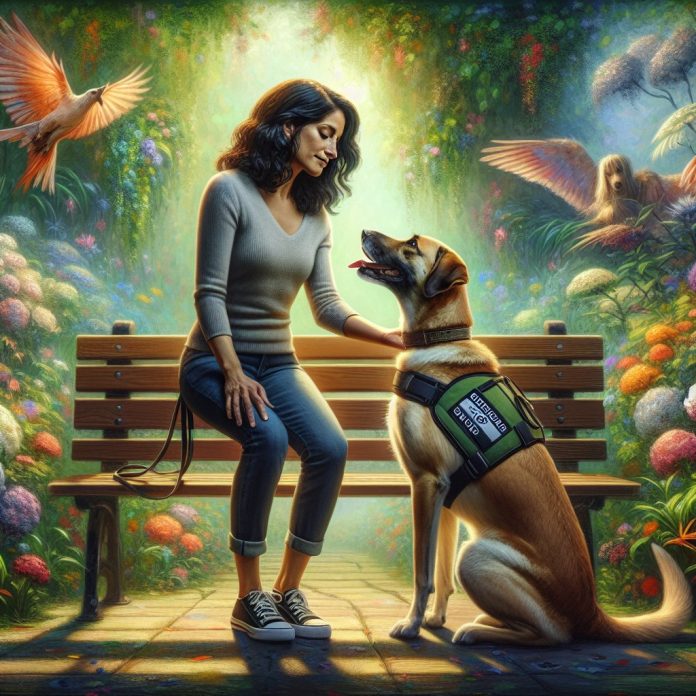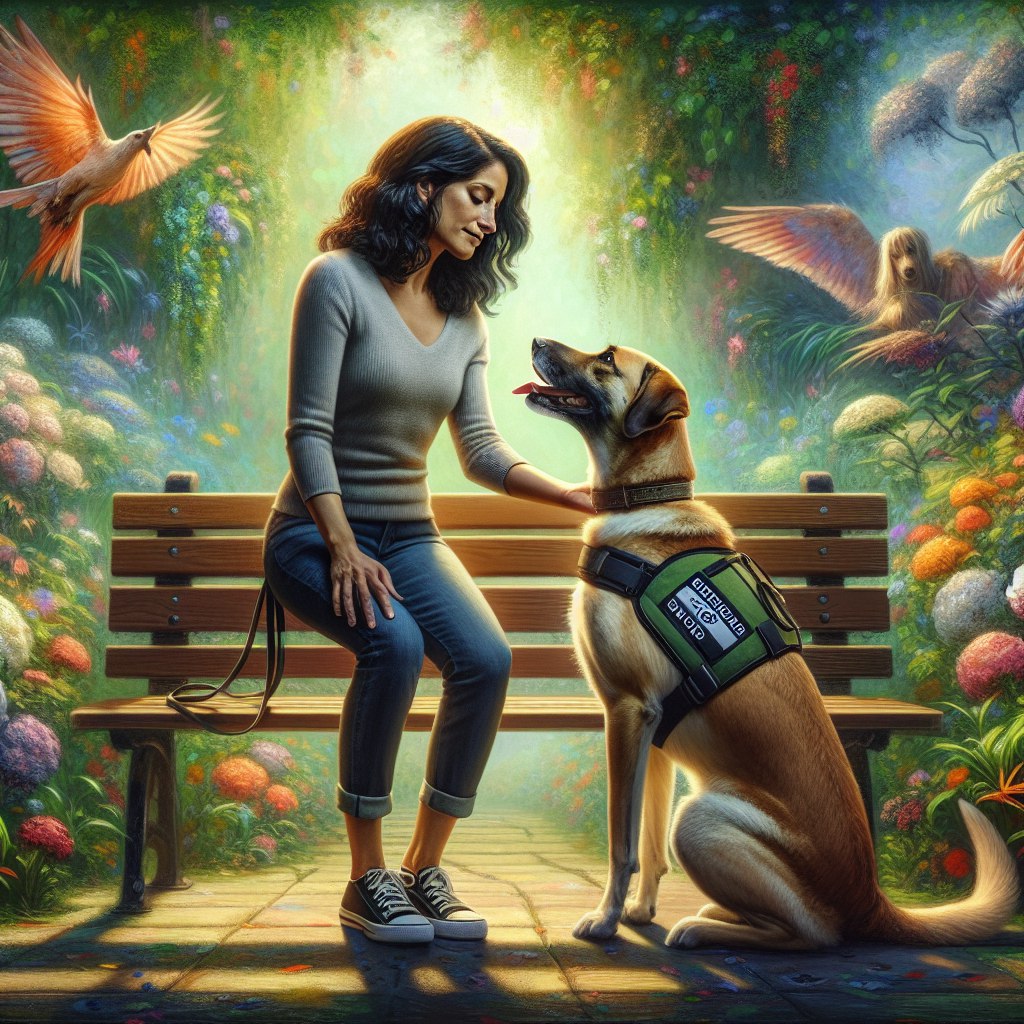
Understanding the Role of Service Dogs for PTSD: How They Provide Support and Assistance
Introduction:
For individuals living with post-traumatic stress disorder (PTSD), navigating daily life can be challenging. The symptoms of PTSD, such as anxiety, hypervigilance, and flashbacks, can significantly impact one’s ability to function independently. In recent years, service dogs have emerged as a valuable companion and support system for individuals with PTSD. In this comprehensive guide, we’ll explore the role of service dogs in assisting individuals with PTSD and how they provide invaluable support to improve their quality of life.
🐾 What is a Service Dog?
A service dog is specially trained to perform tasks and provide assistance to individuals with disabilities. Unlike emotional support animals or therapy dogs, service dogs undergo rigorous training to perform specific tasks that mitigate their handler’s disability. These tasks are tailored to the individual’s needs and may include mobility assistance, alerting to medical conditions, and providing emotional support.
🐶 How Do Service Dogs Assist Individuals with PTSD?
Service dogs play a vital role in supporting individuals with PTSD by performing various tasks that help mitigate their symptoms and improve their quality of life. Some common tasks that service dogs for PTSD may perform include:
- Alerting to Triggers: Service dogs are trained to recognize signs of distress or anxiety in their handlers and intervene by providing physical or tactile cues to help ground them and redirect their focus away from triggers.
- Providing Emotional Support: Service dogs offer unconditional love, companionship, and comfort to their handlers, helping to reduce feelings of isolation and loneliness commonly associated with PTSD.
- Creating Physical Barriers: Service dogs can create a physical barrier between their handler and the surrounding environment, providing a sense of safety and security in crowded or overwhelming situations.
- Performing Room Searches: Service dogs are trained to conduct room searches to ensure the safety of their handler by checking for potential threats or danger before entering a new environment.
- Providing Grounding Techniques: Service dogs are trained to perform grounding techniques, such as deep pressure therapy or tactile stimulation, to help their handler stay present and calm during moments of distress or dissociation.
🐾 Benefits of Service Dogs for PTSD:
The presence of a service dog can have a profound impact on the lives of individuals with PTSD, offering a wide range of physical, emotional, and practical benefits:
- Reduced Anxiety and Stress: Service dogs provide constant companionship and emotional support, helping to reduce anxiety, stress, and feelings of hypervigilance commonly experienced by individuals with PTSD.
- Increased Independence: Service dogs enable individuals with PTSD to regain a sense of independence and autonomy by assisting with daily tasks and activities that may otherwise be challenging.
- Enhanced Quality of Life: Service dogs enhance the overall quality of life for individuals with PTSD by promoting social interaction, improving mood, and reducing feelings of isolation and loneliness.
- Improved Coping Mechanisms: Service dogs help individuals with PTSD develop healthier coping mechanisms by providing a non-judgmental presence and offering support during difficult times.
- Enhanced Sense of Security: Service dogs provide a constant sense of security and protection to their handlers, helping them feel safer and more confident in navigating their surroundings.
🐶 How Are Service Dogs Trained for PTSD Assistance?
Service dogs undergo specialized training to perform tasks that specifically address the needs of individuals with PTSD. Training typically involves:
- Desensitization to Triggers: Service dogs are exposed to various stimuli and trained to remain calm and focused in the presence of potential triggers for their handler’s PTSD symptoms.
- Task Training: Service dogs are trained to perform specific tasks, such as alerting to signs of anxiety or providing grounding techniques, through positive reinforcement and repetition.
- Public Access Training: Service dogs undergo rigorous public access training to ensure they can accompany their handler in various environments and remain well-behaved and obedient at all times.
- Bonding with Handler: Service dogs develop a strong bond with their handler through consistent interaction, training sessions, and positive reinforcement, establishing a trusting and symbiotic relationship.
- Ongoing Support and Maintenance: Service dogs receive ongoing support and maintenance training to reinforce their skills, address any behavior issues, and ensure they continue to meet their handler’s needs effectively.
🐾 Conclusion:
Service dogs play a crucial role in providing support and assistance to individuals living with PTSD, offering a wide range of physical, emotional, and practical benefits. Through their specialized training and unwavering dedication, service dogs help mitigate the symptoms of PTSD, enhance independence and quality of life, and provide invaluable companionship and support to their handlers. As we continue to recognize the importance of mental health and accessibility, service dogs remain a valuable resource for individuals with PTSD, offering hope, healing, and a renewed sense of empowerment in their journey towards recovery.















I was laughing to tears
Thank you so much for taking the time to leave a comment on our recent article about pet news in the United States. We truly appreciate your engagement and feedback.
At [Your Company Name], we strive to provide valuable and informative content for pet owners, and it’s heartwarming to know that our efforts resonate with readers like you. Your input helps us continue to improve and serve the pet-loving community better.
If you have any suggestions or topics you’d like us to cover in the future, please feel free to share. We’re always eager to hear from our readers and tailor our content to meet your needs.
Thank you once again for your support and for being a part of our community.
Warm regards,
I couldn’t suppress my laughter
Thank you so much for taking the time to leave a comment on our recent article about pet news in the United States. We truly appreciate your engagement and feedback.
At [Your Company Name], we strive to provide valuable and informative content for pet owners, and it’s heartwarming to know that our efforts resonate with readers like you. Your input helps us continue to improve and serve the pet-loving community better.
If you have any suggestions or topics you’d like us to cover in the future, please feel free to share. We’re always eager to hear from our readers and tailor our content to meet your needs.
Thank you once again for your support and for being a part of our community.
Warm regards,